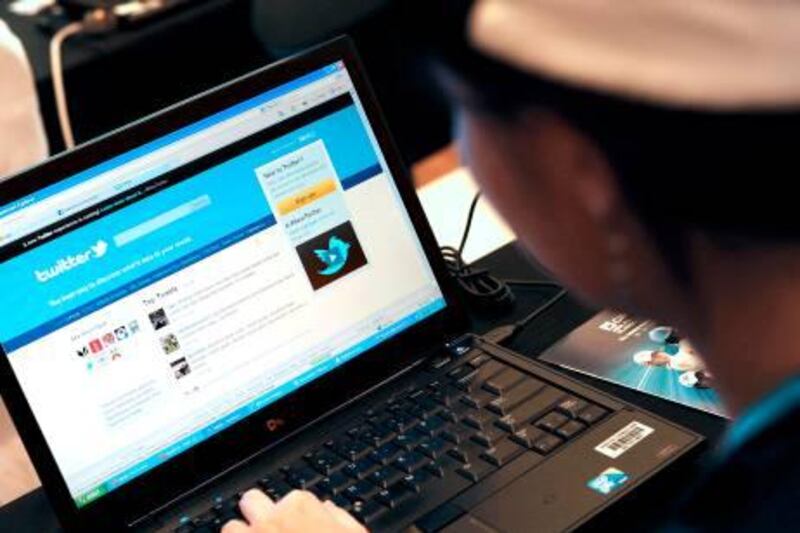DUBAI // The Ruler of Dubai and the Foreign Minister are among six people from the UAE who appear on a new list of the 100 most influential Arabs on Twitter.
Sheikh Mohammed bin Rashid is 30th on the list. The Prime Minister and Vice President has tweeted as HHShkMohd since June 2009, and on the date the list was compiled he had 638,921 followers. He recently posted photos of himself donating blood.
Sheikh Abdullah bin Zayed, the Minister of Foreign Affairs, is 16th. He uses the handle ABZayed to tweet in Arabic and had gathered 85,919 followers since signing up to Twitter just three months before the list was compiled.
Sultan Al Qassemi, the columnist and commentator on Arab affairs who tweets as SultanAlQassemi, had 93,797 followers. He is ranked 22nd.
The other UAE-based Twitter users - or "tweeps" - on the list are the MBC sports presenter and newspaper columnist Mustafa Agha (Mustafa_Agha, 78,124, 25th), the Abu Dhabi Sports TV commentator Faris Awad (farisf9, 187,810, 28th), and the sports broadcaster Khaled Al Shenaif (k_alshenaif, 96,268, 49th).
The list was compiled by Khaled El Ahmad, a social media instructor from Jordan, and has just been published on Wamda, a website for entrepreneurs.
Mr El Ahmad rejected the idea of simply basing the rankings on the number of followers each user had. Instead he used scores produced by the Klout website, which takes into account 35 variables to rate a person’s online influence. The list is based on data collected on January 21.
The FNC member and keen Twitter user Noura Al Kaabi welcomed the embracing of the micro-blogging site by leaders such as Sheikh Mohammed and Sheikh Abdullah.
“It’s definitely a good thing, as we all know Twitter is an important way to connect with people,” she said. “It’s really important to feel that you are connected to the leadership. Twitter is like a personal connection: we know the news, we know their views on what’s happening and it’s just an important communication tool.
“Having them included in the list of most influential people is of course normal because you will have more followers who will like to know what’s going on and the views of the leadership.”
She said she would like to see every minister and member of the FNC on Twitter. “It’s crucial. Ministers can start interacting with people and at the end of the day it’s a social responsibility.”
The top six spots in the list are all occupied by Saudi Arabians, with the Muslim scholar Salman Alodah at No?1. He has 647,690 followers and runs his own website, Islam Today.
A surprise entry is the US president, Barack Obama, who made it to the list because of a parody account, ArabicObama. The account, which has no links to the US administration, took 18th spot with 151,387 followers.
The other 99 listed are all from the Arab world. Saudi Arabia, with 38 per cent of the top tweeps, has the largest share, followed by Egypt with 30 per cent and Kuwait with 13 per cent. The UAE is fourth.
Media is the most common profession among those listed, accounting for 32 per cent of the total, followed by politics at 16 per cent, religion at 10 per cent and royalty at 5 per cent. Men outnumbered women by 86 per cent to 14.
The list has inevitably received a lot of attention on Twitter. EssJay_Bee summed up that those listed were “typically male, media workers from Saudi Arabia & Egypt”, while Mo Elzubeir of Dubai dismissed the findings as “meaningless”.
Shireen Abdelhadi tweeted: “Interesting the gender breakdown of Twitter usage is 86% male ‘n only 14% women! Now we knw wat they r doing at their jobs.”
csimpson@thenational.ae
Arabic Twitter ready by spring
DUBAI // Twitter last night began the process of translating the social network website into Arabic, and said the new version should be operational by the spring.
A grassroots group called Taghreedat has been working on a translation using an army of volunteers, including hundreds in the UAE.
The task has now passed to Twitter’s own translation centre, which has 425,000 volunteer translators around the world.
They will now start work on Arabic along with three other “right-to-left” languages: Farsi, Hebrew and Urdu.
Their job will be to agree on the best translations for all terms used on Twitter so that a complete Arabic interface can be created.
Twitter is already available in 22 languages.
“We’ve developed new ways to ensure tweets and hashtags will work properly in right-to-left languages,” said Twitter spokesman Jodi Olson.
“As soon as our volunteers have finished their translation work, we’ll make Arabic, Farsi, Hebrew and Urdu available for everyone on Twitter.com.”
csimpson@thenational.ae






